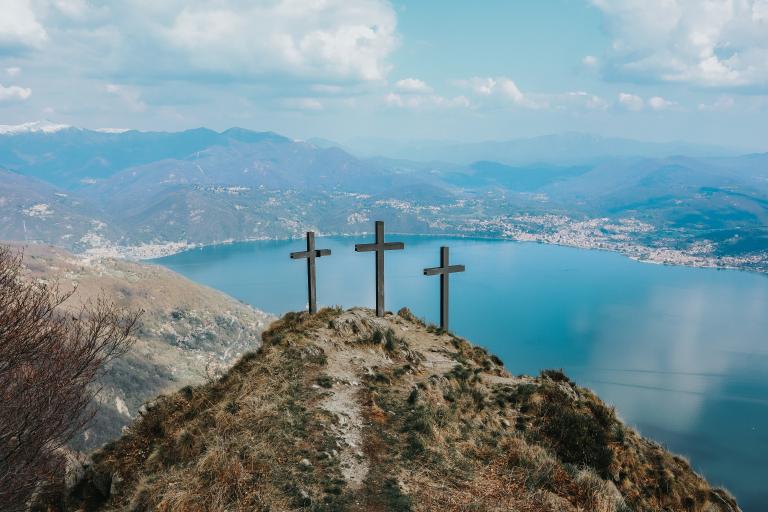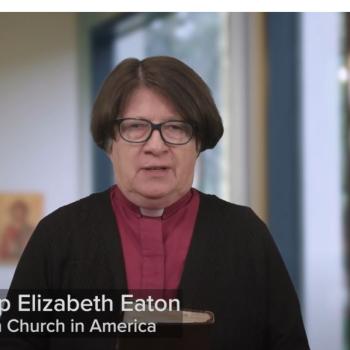On Christ the King Sunday, we experience the cosmic juxtaposition. Right there wedged in the divide, Jesus shows us that even our most vehement critics and enemies need healing and nourishment, need prayer and forgiveness.

Text: Luke 23:33-43
When they came to the place that is called The Skull, they crucified Jesus there with the criminals, one on his right and one on his left.
For the Israelites, the Place of the Skull was familiar to all who visited Jerusalem. Golgotha was a place where citizens would pass on their way to market or dispose of their rubbish. The Gospel says people were passing by that place and paused to see what had become of the “King of the Jews.”
That placard above his head was, of course, mocking Jesus. It was an anti-Semitic slur. They were taunting him. But his followers probably wished that he would, indeed, become the King they hoped for. They wanted him to miraculously free himself those nails and planks, descend from the cross and clear Jerusalem once and for all from Roman rule.
We can hardly blame them. When people are oppressed, when rulers strip people of their rights, of course they seek a change. People are always looking for a leader, a president, a king.
But if Jesus is that one in whom they have placed their hope, what kind of King is this?
No palace, no political power, no army coming to his rescue. All we see is a blood-soaked crown of thorns and a wooden cross out here in this God-forsaken place – the garbage dump.
Yet in our worship services on Christ the King Sunday, we sing hymns that are a strange juxtaposition to what we see in this text. How is it that we sing hymn’s like “Jesus Shall Reign” and “Crown Him with Many Crowns” while also proclaiming Christ crucified?
We do this because Christ the King Sunday is not just about Divine Glory. It’s about suffering as well.
In the Gospel of Matthew, Jesus said that when you feed the hungry, when you clothe the naked, you are doing this to him! He is directly identifying with the brokenness and vulnerability of this world, of our human society. So Christ the King is not just about the light in all things, it’s about the wounds in all things.
Theologian Matthew Fox says that this is Christianity’s greatest contribution to the wisdom tradition. The crucifixion story shows us that the Cosmic Christ is not just present at the time of light and life, but at the time of suffering and death, darkness and destruction. So, if we want to fully understand the Cosmic Christ, if we want to truly enter into this Christ the King Sunday, we have to be willing to embrace not just the light and glory of Christ. We must also face and embrace the profound suffering and injustice done to God, the Earth, and ourselves.
You see, coming to church and being a Christian is not just about being comforted and pious. It’s about encountering Christ in those places where injustice is happening, in those places where domination and death are happening.
When Pilate asked Jesus “Are you a king?” it’s the question that all the powers and principalities are asking. It’s the question we’re all asking. We want to know – who is lord of the universe? Is it any human ruler? Or the almighty dollar? Is it the one with the biggest weapons? Or the most powerful technology?
Scripture tells us: no – glory belongs to the Lamb of God.
Did you ever wonder why it’s the Lamb of God?

Because it was the lamb, the child, who was slain on the cross. And it is always the child who is slain by imperialism, by war, by domestic abuse, by any form of arrogance and domination. It is always the children, those most vulnerable, who suffer when some other entity or person takes it upon themselves to say that they are the ruler of the universe. It’s that lamb we have to guard and protect in ourselves, in our communities. It is the human vulnerability that we have to honor if we want to worship the true king, Jesus the Christ.
Honoring this vulnerability is especially important given the divisiveness we’re experiencing in our country right now. We need to remember that Jesus comes into even those most divided places.
At Golgotha Jesus was fixed there between heaven and earth, and hung between two criminals, one on his right and one on his left.
Even in that place of dying, they were debating. What kind of King is this man? One wanted him to come down off the cross and end their suffering. But the other asked something different. “Jesus remember me when you come into your kingdom.”
Jesus heard him and promised: “Today you will be with me in Paradise.”
Right there wedged in the divide, Jesus shows us that even our most vehement critics and enemies need healing and nourishment, need prayer and forgiveness.
Once again, we find the cross at the center of the divisiveness, the turmoil, and the oppressive powers and principalities of the world. Jesus hangs between the mocking crowds and those who cry out to be remembered. It is in that liminal and suffering space where Christ is King.
That’s exactly where the Church which bears Christ’s name needs to be too. And that’s why we cannot sing about this “feast of victory for our God” without also remembering that at Good Friday, we sing about the “sacred head now wounded.” The crucifixion story is about how Jesus became yet another victim of state-sanctioned murder. The cosmos itself responded: the sun became dark and the whole earth shook. It’s a cosmic experience!
The temple curtain was torn in two. That detail refers to an ancient Jewish teaching – that when a just person is killed unjustly, the holiness of God is injured.
The whole earth trembles when the innocent suffer and die.
When another species becomes extinct, the whole universe is rent in two. When a Kurdish woman in Syria is raped, the whole universe shudders. When a child is shot in their school, the entire cosmos shakes. God suffers and dies every time another crucifixion happens in our world.
But after the dust settles, after the gravestone is in place, and the only sound is weeping in the garden – that is when the Risen Christ appears. Notice that after the resurrection, no one says, “we have seen Jesus.” No, they say, “we have seen the Lord.” The Lord has risen. The Cosmic Christ, the Lamb of God, the woman in Syria, the child in the school, the last bird of the species has risen. On this side of the cross, we do not yet see it. But the risen Christ assures us that their resurrection will happen as well.
This is what we mean when we worship Christ the King. This is what we sing about in our hymns. This Cosmic Christ, this radiant, vulnerable, suffering, resurrected one is who we trust, who we worship. Come, let us worship Christ the King, the Lamb of God, the Cosmic Christ, who was, who is and who is to come! Amen.

Leah D. Schade is the Assistant Professor of Preaching and Worship at Lexington Theological Seminary in Kentucky. She is the author of Preaching in the Purple Zone: Ministry in the Red-Blue Divide (Rowman & Littlefield, 2019), Rooted and Rising: Voices of Courage in a Time of Climate Crisis (Rowman & Littlefield, 2019), and Creation-Crisis Preaching: Ecology, Theology, and the Pulpit (Chalice Press, 2015).
Twitter: @LeahSchade
Facebook: https://www.facebook.com/LeahDSchade/













